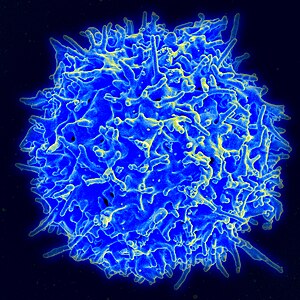T cell deficiencies
| T cell deficiency | |
|---|---|
 |
|
| Human T Cell | |
| Classification and external resources | |
| Specialty | Immunology |
| ICD-10 | D84.8, |
| ICD-9-CM | 279.3 |
T cell deficiency is a deficiency of T cells, caused by decreased function of individual T cells, it causes an immunodeficiency of cell-mediated immunity. T cells normal function is to help with the human body's immunity, they are one of the two primary types of lymphocytes(the other being B cells).
Presentations differ among causes, but T cell insufficiency generally manifests as unusually severe common viral infections (respiratory syncytial virus, rotavirus), diarrhea, and eczematous or erythrodermatous rashes.Failure to thrive and cachexia are later signs of a T-cell deficiency.
In terms of the normal mechanism of T cell we find that it is a type of white blood cell that has an important role in immunity, and is made from thymocytes One sees in the partial disorder of T cells that happen due to cell signaling defects, are usually caused by hypomorphic gene defects Generally, (micro)deletion of 22Q11.2 is the most often seen.
The main pathogens of concern in T cell deficiencies are intracellular pathogens, including Herpes simplex virus, Mycobacterium and Listeria. Also, intracellular fungal infections are also more common and severe in T cell deficiencies. Other intracellular pathogens of major concern in T cell deficiency are:
...
Wikipedia
